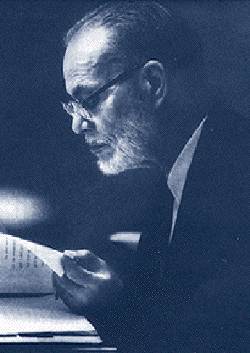 By Yasser Latif Hamdani
By Yasser Latif Hamdani
Last week (February 6) marked the 114th Birthday of one of Pakistan’s greatest unsung heroes. Once again, there was no mention of commemoration of his remarkable like. No sense of gratitude from a nation for which he did so much. He has been wiped out of our memory because he was an Ahmadi, despite his glorious contributions to Pakistan and its cause (see related post on Dr. Abdul Salam).
Sir Zafrullah Khan’s services rendered to Muslims of India, Pakistan and the Third World are second only to that of Quaid-e-Azam Mahomed Ali Jinnah. As a jurist, a diplomat and a patriot he stood head and shoulders above the lesser men who have made a mockery of our republic.
Born in 1893 in Sialkot in what was to become one of the earliest Ahmaddiya households, this small town boy rose to be one of the shrewdest legal minds of his time. His early education was in Sialkot, after which he proceeded to Lahore for his bachelors degree, under the tutelage of none other than the great Iqbal himself. He got his law degree from King’s College London in 1914, where he stood top of his class and was the first person from the Indian subcontinent to do so. He was, like most great figures of that time, called to bar at Lincoln’s Inn.
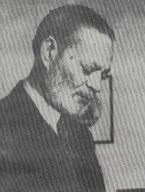
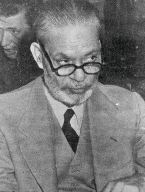
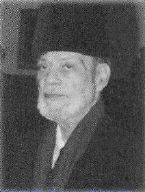


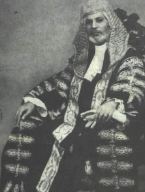
As a practicing lawyer, he soon proved his mettle and had many reported cases to his name. The first major politician to recognize Zafrullah’s talents was Sir Fazli Hussain, the founder of Unionist Party of Punjab. Starting his career in his early 30s as a member of the Punjab legislative Council, he rose to prominence as an indefatigable crusader for Muslims of Punjab. Later he represented the Muslims at round table conference and crossed swords with figures like Jinnah and Gandhi. In 1931, he became the Muslim League president and at the roundtable conference, he cornered no less a person than Churchill in a committee hearing who was forced to accept Zafrullah’s point of view.
Later he was offered a seat on Viceroy’s permanent Council, which he took to further his cause. He also served at varying times as the minister of Railways, Public works, labour and law under the Viceroy. For a brief period, he also became British India’s representative to the League of Nations, just before it was dissolved.
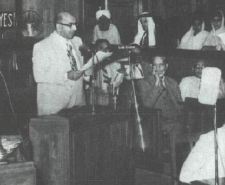
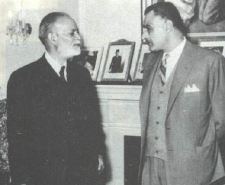
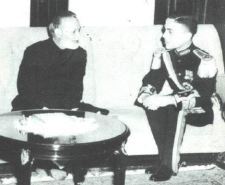
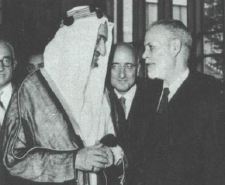
![]()
However his greatest contribution came when he drafted the famous Lahore Resolution, which till this day is the rallying point of Pakistan and Pakistani nationalism. He had been tasked with finding a common point between the popular demand for “Pakistan” and Muslim League’s all India requirements. The Lahore resolution was a broad based solution which left the door virtually open for several solutions and negotiation on the issue of partition. In essence it envisaged 2 or 3 great republics for the Muslim peoples and it was this document which forms the basis not just of Pakistan but also of Bangladesh. For this he got a lot of slack. No less a person than Khan Abdul Wali Khan highlighted Zafrullah’s religious belief to play on the popular conspiracy theory that holds Ahmadis to be British touts.
Later from 1942 onwards, he served as a federal judge (equivalent of an Supreme court C judge) of India and finally took leave on the eve of Pakistan to serve the cause of Pakistan before the Radcliffe Commission, on Jinnah’s personal request. On 25th December 1947, Jinnah appointed him the Foreign Minister of Pakistan. At the UN, Sir Zafrullah emerged as the most eloquent advocate of all third world and Islamic issues. It was Zafrullah whose efforts materialized into the UN Resolutions on Kashmir, which are the basis of the Pakistani case and grievance. Later he became the first Asian president of the International Court of Justice, a singular and unique honor for any Pakistani. He also served, briefly, as the President of the UN General Assembly. He passed away in September of 1983 in Lahore.
A prolific author on the history of Pakistan and Islam, his most famous book was titled “Agony of Pakistan” in which he makes plain the great betrayal which wrested the country from the hands of its patriots into the hands of those who were its greatest enemies. Ironically, today Jinnah’s most trusted lieutenant is not even remembered by the state which owes him so much, including its own founding document. It is the memory of people like Zafrullah Khan that will keep alive the original idea of Pakistan and there is no doubt that one day the posterity will reclaim its true destiny as a progressive and modern republic.
Yasser Latif Hamdani is a lawyer in Lahore and a researcher of the history of the Pakistan Movement.




















































Asalam Alaikum,
its very nice to found such good website on the network. i really appreciate the work of Yasir Latif Hamdani. i have query from yasir. Are you Ahmadi? Please reply me soon. i am sending this link to my friends so that they can came to know the Sir Zafarullah Khan Sahib. Once Again i thanks to Yasir.
i like the comments from Asma as well. for any query you can contact me any time on above said Email ID.
The military dictators and their cronies who ruled Pakistan for almost thirty years did their best to alter the history in a manner they believed to be more in line with their imposed ideals. The events, their significance and personalities attached with them have been altogether tempered. It is quite common to hear that Sir Syed Ahmed was an Islamic scholar; Mehmood Ghznavi was a Muslim hero who conquered India in order to spread the word of God and so on and so forth. These and other facts are hardly ever quoted with truth and in right perspective.
Among all, the Zia era was most significant in the sense that many of our national heroes, belonging to minorities and other religions, were wiped from the history books and the generation growing up in those tumultuous years is totally oblivious of what has been done for this country by those inspiring souls. Zia promoted an intolerant society. Hypocrisy is the one word which is most suited to describe the social setup in those (and even now as well) days. The state became the proprietor of one particular religious thought and people not aligned with that were systematically purged from virtually every field.
Ahamdis and Christians are the two worst affected communities. Many of there important people and there heroic contribution for their country was deliberately forgotten during Zia regime.
Cecil Chaudary, a Christian by religion fought the 1965 Indo-Pak war as a young fighter pilot in Pakistan Air Force. Even to this day his colleagues remember him as one of the top ace pilot who did heroic efforts to save his country. But during Zia era, when the concept of an Islamic militant soldier was officially adopted, he was totally wiped from the historical accounts. Now almost no one remember him. A senior and decorated air force officer, he resigned later when he was denied promotion and passed over by a lower-ranking Muslim officer.
Similar is the case with Ahmadi army officers, many of them served the country very well but deliberately denied recognition. During the Islamization of the military they were completely forgotten and today no one knows that who was General Akhtar Hussain Malik and Brig. Iftikhar Janjua. Who was Dr. Abdul Salaam and why the world respect him so much.
Another great son of this soil who has been forgotten and deliberately belittled is Chaudary Muhammad Zafraullah Khan. He has been a witness to most important events in our history. Mohammad Ali Jinnah entrusted him to represent Pakistan in the boundary commission. Later he was given the Foreign office of the newly formed Pakistan where he presented not only the Pakistan
Dear Yasser Latif Hamdani.
First time I came across this website. Realy liked it. It has renewed my faith in pakistan, we still have people who know the truth, who like to know the truth and who can rise and can stand above the cloud of misinformation created by years and years of misinformation.
Well done. Keep good work going.
Bye. Mehmood
kindly see u its link:
http://www.hindustanexpressdaily.com/khasusi_peshk ash.htm
Assalam-o-alikum Guys,
This is just a co incidence that from last few days i am home and reading a book “The Reminiscences of SIR MUHAMMAD ZAFRULLA KHAN”, Interviews by Prof. Wilcox & Prof. Embree for Columbia Univeristy, & Introduction by Prof: Perwazi. On the life of Sir Muhammad Zafrullah khan. This is our dilemma that people who were against the creation of Pakistan came into power after the partition and those who did efforts got forced to sideline. Our history tempered gradually and no one did any thing to stop that, our young generation did not even know who was the first foreign minister of pakistan and who was with and against of creation of it. After 50 + years of creation of this beautiful land we are killing each other in the name of islam, in the name of terrorrism. We are in the middle of no where, stranded and stuck between many issues. I hope, wish and pray for those who helped in the creation of this mother land and pray for those who are in Government or will be in the Government to use their common sense and i wish they put our country first before any thing in their mind.